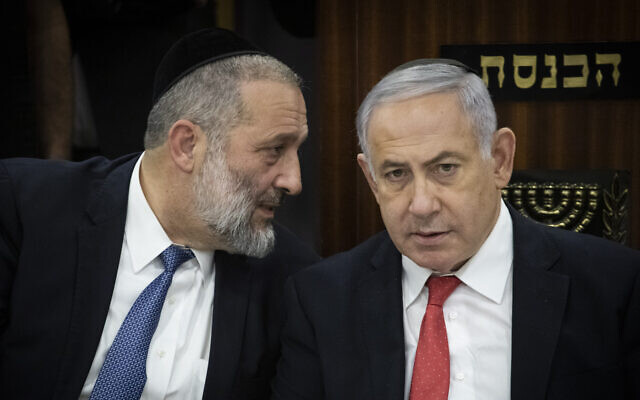Shas leader Deri proposes direct vote for prime minister, but without going to full elections.
By Paul Shindman, World Israel News
In an attempt to resolve the political crisis and prevent a fifth election, the religious Shas Party is submitting a proposal to the Knesset Monday to enact a law to allow the direct election of the prime minister, Kan News reported Monday.
The bill requires the support of at least 61 members of the 120-seat Knesset, Israel’s parliament, and it is unclear whether the proposal will have the needed majority.
“[Shas leader Aryeh] Deri has proposed this in the past. This is a right and worthy thing,” Shas Knesset member Yinon Azoulay told Kan Radio. “Will reach a point where only one will be elected and he will be the prime minister. To choose the person who the people want.”
According to the proposal, the law would set the legal groundwork for a lightning election to be held within 30-45 days, but instead of a general election Israelis would only vote for whom they want as prime minister. The winner will receive additional parliamentary power to form a new government.
With all parties nervous about their potential success if Israel has to have a fifth election, the proposed bill still needs a majority in the Knesset to pass.
In public opinion polls for the past several years, Israelis have consistently said they prefer Prime Minister Benjamin Netanyahu compared to other party leaders, but those numbers have always been less than 50% of the respondents. The current parties in the Knesset hoping to unseat Netanyahu would therefore be taking a risk if they offer their support for such a special election.
Under the current system, after a general election the president of Israel meets all the parties that won seats and selects the party leader with the most recommendations. Rivlin picked Netanyahu, who has 28 days to try and form a government.
The proposal comes as a possible solution to Israel’s political deadlock following the inconclusive election results last month. Although Netanyahu’s Likud Party won the most seats of any of the 13 parties elected, he only has 30 members in the house and so far only has support of several smaller parties to bring his total to 52 seats, short of a majority coalition.
Netanyahu is apparently willing to consider advancing the proposal, but it is unclear whether the leader of the right-wing Yemina party, Naftali Bennett, will support it, Walla News reported.
Deri met Bennett on Sunday in a bid to convince him to accept the idea, as Shas prefers Netanyahu at the helm and should Netanyahu fail to gain a majority Deri wants to prevent the possible formation of a government headed by a shared premiership between Bennett and Yair Lapid, leader of the Yesh Atid party.
Deri had raised the same proposal after the inconclusive second round of elections in 2019. At the time, Netanyahu himself called for a direct election for prime minister between him and Blue And White party leader Benny Gantz, in order to prevent “unnecessary” elections to the Knesset. The proposal was never adopted and the country has had two subsequent elections that also ended with no clear winner.
Netanyahu has two weeks left in his mandate to try and form a government, and if he fails the task might be passed on to Lapid or Bennett – a move that Netanyahu is desperately trying to prevent.
Writing in Israel Hayom, columnist Mati Tuchfeld called the direct election concept “the least that the politicians from all sides can do on behalf of the citizens, who are fed up with endless elections, dysfunctional governments and the political and ideological fire sales that have complemented this surreal and ongoing process.”
However, political analyst Attila Somfalvi said the direct election proposal is actually a Deri ploy to shift his alliance and ditch Netanyahu.
“We see where this whole story is headed. And it isn’t to a Netanyahu government,” Somfalvi wrote on Ynet. “It’s heading to a Bennett government. And Deri wants to get on board. He’s laying the groundwork. Bennett is smart. There were constantly rumors about how the Ashkenazi [ultra-Orthodox politicians] would betray Netanyahu, but we’re not stupid. No one is stupid. We understand perfectly well what Deri is doing.”





